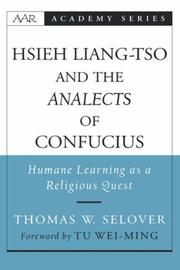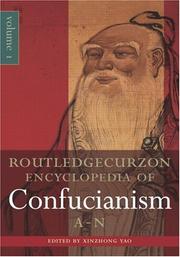| Listing 1 - 4 of 4 |
Sort by
|
Book
ISBN: 0520066731 0585041083 Year: 1990 Publisher: Berkeley Los Angeles ;Oxford University of California press
Abstract | Keywords | Export | Availability | Bookmark
 Loading...
Loading...Choose an application
- Reference Manager
- EndNote
- RefWorks (Direct export to RefWorks)
Philosophy, Confucian --- Political science --- Philosophy & Religion --- Philosophy --- History --- S12/0430 --- S12/0240 --- -Philosophy, Confucian --- -Confucian philosophy --- Confucianism --- Philosophy, Chinese --- Administration --- Civil government --- Commonwealth, The --- Government --- Political theory --- Political thought --- Politics --- Science, Political --- Social sciences --- State, The --- China: Philosophy and Classics--Neo-Confucianists: general and Song (including lixue 理學) --- China: Philosophy and Classics--Chinese philosophy: Qing --- -Changzhou (Jiangsu Sheng, China) --- -Intellectual life --- -China: Philosophy and Classics--Neo-Confucianists: general and Song (including lixue 理學) --- Confucian philosophy --- Changzhou (Jiangsu Sheng, China) --- Chʻang-chou, China --- Changchow (Jiangsu Sheng, China) --- Chʻang-chou (Jiangsu Sheng, China) --- Changzhou Shi (China) --- Chʻang-chou shih (Jiangsu Sheng, China) --- 常州 (Jiangsu Sheng, China) --- 常州市 (Jiangsu Sheng, China) --- Intellectual life. --- Neo-Confucianism --- China --- Ch'ang-chou shih (Kiangsu province, China) --- Intellectual life --- 19th century

ISBN: 0195156102 0198035489 1280837861 1429438797 9781429438797 9780198035480 0197739539 Year: 2005 Volume: *1
Abstract | Keywords | Export | Availability | Bookmark
 Loading...
Loading...Choose an application
- Reference Manager
- EndNote
- RefWorks (Direct export to RefWorks)
This is a focused analysis of the core value of Confucian thought, namely jen (humanity or co-humanity), through an investigation of Hsieh Liang-tso's analysis of the 'Analects' of Confucius. It also contains a translation of Hsieh's commentary on the 'Analects'.
Humanities and religion --- Religion and the humanities --- S12/0363 --- S12/0430 --- China: Philosophy and Classics--Lunyu 論語 Analects --- China: Philosophy and Classics--Neo-Confucianists: general and Song (including lixue 理學) --- Humanities --- Confucius. --- Xie, Liangzuo, --- Hsieh, Hsien-tao, --- Hsieh, Liang-tso, --- Hsieh, Shang-tsʻai, --- Hsieh, Wen-su, --- Shang-tsʻai, Hsieh, --- Shang-tsʻai-hsien-sheng, --- Shangcai, Xie, --- Shangcaixiansheng, --- Xie, Shangcai, --- Xie, Wensu, --- Xie, Xiandao, --- 謝良佐, --- Xie, Liangzuo --- Confucius --- Religion and the humanities. --- Xie, Liang-tso.

ISBN: 0700711996 0415306523 0415306531 9780415306539 9780700711994 9780415306522 Year: 2003 Volume: 1 Publisher: London: Routledge,
Abstract | Keywords | Export | Availability | Bookmark
 Loading...
Loading...Choose an application
- Reference Manager
- EndNote
- RefWorks (Direct export to RefWorks)
This unique reference covers Confucianism as a whole, in 1235 entries on its history, doctrines, schools, rituals, sacred places and terminology, and on the new thinking taking place in China and other Eastern Asian countries. Written by an international team of specialists, it provides extensive textual cross-references, bibliographies, and three comprehensive indexes. Entries include: * Altar to the Sun * Benran zhixing (Original human nature) * Boshi (Erudites or Academicians) * Cheng Duanmeng (1143-1191) * Chijing (Holding or maintaining seriousness) * Ching, Julia (1934-2001) * Chuanxi Lu ('Instructions for Practical Living') * Confucianism and Capitalism * Confucianism and Christianity * Dade xiaode (Great virtue and petty virtue) * Da zhangfu (Great man) * E (Evil, disagreeable, to dislike) * Fan Zhen, (1008-89; 'zi' Jingren) * Fufu (Husband and wife) * Gong (Acting for public interests) * He Lin (1902-1992, 'zi' Zizhao) * Jiaohua (To educate and transform) * Kaitokud (the Merchant Academy of Osaka) * Kojiki ('Records of Ancient Matters') * Liangxin (the good or innate mind) * Luan (Disorder, chaos) * Min (The people, the masses) * Neisheng waiwang (Sageliness within, kingliness without) * Ping tianxia (Making the world peaceful) * Qi qing (Seven emotions) * Renlun (Human relationships) * Rites of Passage * Rujia bapai (The eight Confucian factions) * Sang li (Rites of mourning and burial) * Se (Countenance, sensual beauty) * Tianxia (The World) * Wu Jing (The Five Classics) * Xian sheng (the First Sage) * Yan Zhitui (531-591, 'zi' Jie) * Zhangyou (Senior-junior relationship) * And many more.
Comparative religion --- Philosophy --- Confucianism --- Confucianists --- Confucianisme --- Confucéens --- Encyclopedias --- Biography --- Dictionaries --- Encyclopédies --- Biographie --- Dictionnaires anglais --- S12/0400 --- S12/0100 --- 299.512 --- Religions --- China: Philosophy and Classics--Kongzi 孔子 Confucius and Confucianism --- China: Philosophy and Classics--Bibliographies, dictionaries, yearbooks and collections --- Confucianisme. Mencius. I Ching --- J1440 --- J1006 --- K9040 --- K9031.60 --- 299.512 Confucianisme. Mencius. I Ching --- Japan: Philosophy -- Confucianism --- Japan: Philosophy -- Reference works --- Korea: Philosophy and thought -- schools -- Confucianism --- Korea: Philosophy and thought --Reference works --- Confucéens --- Encyclopédies --- Confucianism - Encyclopedias. --- Korea: Philosophy and thought -- reference works --- encyclopedia --- Encyclopedias.
Book
ISBN: 9789004315457 9004315454 9004318739 9789004318731 Year: 2016 Volume: 132 Publisher: Leiden ; Boston Brill
Abstract | Keywords | Export | Availability | Bookmark
 Loading...
Loading...Choose an application
- Reference Manager
- EndNote
- RefWorks (Direct export to RefWorks)
Yan Yuan (1635-1704) has long been a controversial figure in the study of Chinese intellectual and cultural history. Although marginalized in his own time largely due to his radical attack on Zhu Xi (1130-1200), Yan was elevated to a great thinker during the early twentieth century because of the drastic changes of the modern Chinese intellectual climate. In Body, Ritual and Identity: A New Interpretation of the Early Qing Confucian Yan Yuan (1635-1704) , Yang Jui-sung has demonstrated that the complexity of Yan’s ideas and his hatred for Zhu Xi in particular need to be interpreted in light of his traumatic life experiences, his frustration over the fall of the Ming dynasty, and anxiety caused by the civil service examination system. Moreover, he should be better understood as a cultural critic of the lifestyle of educated elites of late imperial China. By critically analyzing Yan’s changing intellectual status and his criticism that the elite lifestyle was unhealthy and feminine, this new interpretation of Yan Yuan serves to shed new light on our understanding of the features as well as problems of educated elite culture in late imperial China.
S12/0450 --- S02/0210 --- China: Philosophy and Classics--Ming, Qing: later Confucian teachings, Sacred Edicts (incl. Wang Fuzhi, Yan Yuan, Li Kong, Dai Dongyuan) --- China: General works--Intellectuals: general and before 1840 --- Philosophers --- Confucianists --- Radicals --- Elite (Social sciences) --- Civil service --- Elites (Social sciences) --- Leadership --- Power (Social sciences) --- Social classes --- Social groups --- Ideological extremists --- Political extremists --- Extremists --- History. --- Examinations --- Yan, Yuan, --- Zhu, Xi, --- Chu, Hsi --- C̄ū, Hī --- Chu, Hi --- Choo, He --- Tschu, Hi --- Shu, Ki --- Chu, Hy --- Tchou, Hi --- Chu, Hũi --- Tchu-hi --- Zhu, Fuzi, --- Chu, Fu-tzu, --- Choo-Foo-Tze, --- Choo-foo-tsze, --- Chu, Puja, --- 朱夫子, --- Zhu, Zi, --- Chu, Tzu, --- Zhuzi, --- Chu-tzu, --- Chuja, --- Shu-shi, --- Shushi, --- 朱子, --- Zhu, Yuanhui, --- Chu, Yüan-hui, --- 朱元晦, --- Zhu, Zhonghui, --- Chu, Chung-hui, --- 朱仲晦, --- Zhu, Hui'an, --- Chu, Hui-an, --- 朱晦庵, --- Zhu, Huiweng, --- Chu, Hui-weng, --- 朱晦翁, --- Zhu, Dunweng, --- Chu, Tun-weng, --- 朱遯翁, --- Yungulaoren, --- Yün-ku-lao-jen, --- 云谷老人, --- Cangzhoubingsou, --- Tsʻang-chou-ping-sou, --- 沧洲病叟, --- Zhu, Ziyang, --- Chu, Tzu-yang, --- 朱紫陽, --- 朱紫阳, --- 朱熹 --- Yen, Yüan, --- Yan, Xizhai, --- Zhu, Bangliang, --- Siguren, --- Yan, Yizhi, --- Yen, Hsi-chai, --- Chu, Pang-liang, --- Ssu-ku-jen, --- Yen, I-chih, --- 顏元, --- 顔元, --- 颜元, --- Political and social views. --- Criticism and interpretation. --- Adversaries. --- China --- History
| Listing 1 - 4 of 4 |
Sort by
|

 Search
Search Feedback
Feedback About UniCat
About UniCat  Help
Help News
News